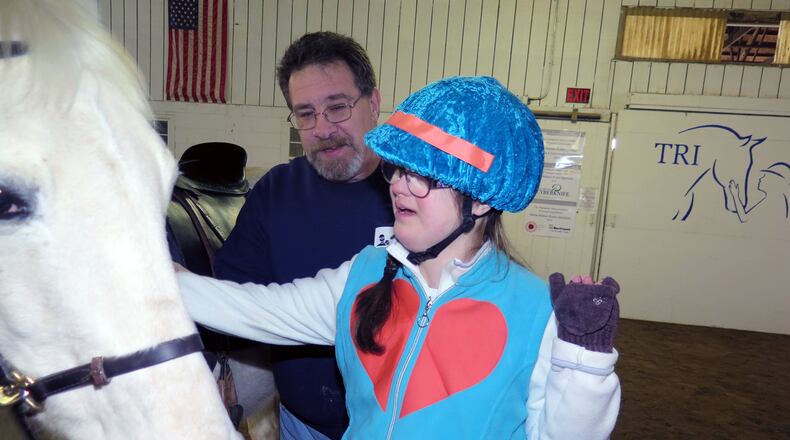“My son was great in school and I always taught him to treat everyone the same, no matter their disability or race,” Ball said. “A friend told me about a therapeutic riding program in Springboro and since my son liked horses, I thought it would be perfect.”
Ball’s son loved volunteering for the program in Springboro, “Bridge Riding for the Disabled” and Ball soon became involved himself, purely by an accident of circumstance.
“I was sitting in the parking lot reading a book and waiting for my son,” Ball said. “The executive director came up to me and said she was short a helper.”
Ball, who had no experience with horses, was naturally hesitant, but the director assured him he could learn. He ended up volunteering for the program for six years, until his son passed away.
“Out of the blue a friend emailed me about a year later and told me about a new therapeutic farm in Springboro,” Ball said. “I went in and liked what I saw so I signed up to volunteer.”
The program was the Therapeutic Riding Institute (TRI), which has founded in 1973 and was one of the first horseback riding programs in the nation to provide lessons for special needs children and adults.
“I’ve done a variety of jobs over the years,” Ball said. “From side helper to ring assistant. I also take care of the horses.”
Ball, who works two jobs, donates about 200 hours of his time each year to TRI. The institute offers horseback riding lessons for the special needs population, veterans and youth at risk.
READ THIS NEXT: Transportation options for senior citizens
“One of our goals at TRI is to get our students to ride independently or as close as possible to that,” Ball said. “This isn’t a pony ride. Our kids are learning horsemanship and are going through therapy but they don’t realize it because they enjoy it so much.”
Students participating in therapy through horseback riding end up working muscles, working on vocalization and learning other skills related to animal care. TRI currently has about 200 students enrolled, from as young as about 7 years old up through young adulthood.
“We see a lot of different diagnosis with our students,” Ball said. “When a new student comes in there is an assessment and volunteers are given four to five target areas to work on for the eight-week session. Every child is completely different and many have never been around horses before.”
The individualized programs are one aspect that makes TRI unique, and the center is also accredited as a premier therapy program by the Professional Association of Therapeutic Horsemanship (PATH). TRI also keeps the same volunteers and students together for the duration of their eight-week program.
“I’ve seen many wonderful cases of kids improving by riding,” Ball said. “I worked with a young lady in a wheelchair who couldn’t walk but after riding a year, we saw big improvements. Today she is walking with two canes and has become very verbal.”
Volunteers like Ball walk beside students and encourage them every step of the way and over time, Ball said they often see miracles happen.
“We’ve seen first steps but we’ve also seen first words,” Ball said. “When a parent hears the word ‘whoa’ out of a kid who isn’t talking, they often start crying. And we do, too.”
Many students remain with TRI and have been riding for more than a decade. Some have become independent and are volunteering as well.
But as successful as TRI has been, the organization is limited by its facilities, which its has outgrown.
“We have moved 14 times since 1973,” Ball said. “Our goal is to find our forever home.”
TRI is working on the possibility of kicking off a capital campaign soon. It also hosts a large “friendraiser” each year to garner support and funds. This year’s event, “Kickin’ our Boots Back to our Roots,” will be held on Aug. 12 at Canopy Creek Farm in Miamisburg.
“To me this is like a big family,” Ball said. “We share a common bond and that’s the love of these kids. I believe if you have a heart and you want to give and see miracles happen, this is a great place to do it. These kids have more love and heart than you will ever find. And all they want is to be loved back.
For more information about volunteering or the upcoming event, log on to TRIOhio.org
About the Author
